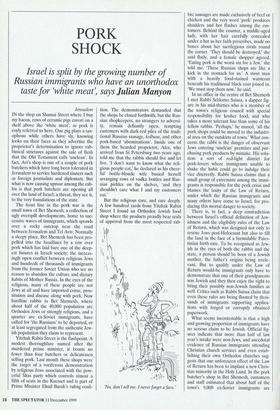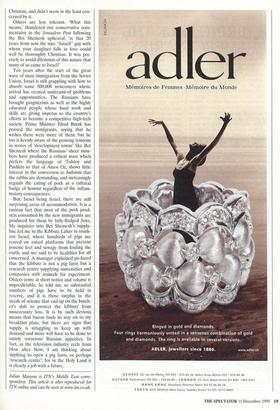PORK SHOCK
Israel is split by the growing number of Russian immigrants who have an unorthodox taste for 'white meat, says Julian Manyon
Jerusalem IN the shop on Shamai Street where I buy my bacon, rows of ceramic pigs cavort on a shelf above the 'white meat', as pork is coyly referred to here. One pig plays a sax- ophone while others have sly, knowing looks on their faces as they advertise the proprietor's determination to ignore rab- binical strictures against the sale of flesh that the Old Testament calls 'unclean'. In fact, Avi's shop is one of a couple of pork butchers which have long been tolerated in Jerusalem to service hardened sinners such as foreign journalists and diplomats. But what is now causing uproar among the rab- bis is that pork butchers are opening all over the land of Israel; a threat, they see it, to the very foundations of the state.
The front line in the pork war is the small town of Bet Shemesh, a collection of ugly overspill developments, home to suc- cessive waves of immigrants, which sprawls over a rocky outcrop near the road between Jerusalem and Tel Aviv. Normally a sleepy place, Bet Shemesh has been pro- pelled into the headlines by a row over pork which has laid bare one of the deep- est fissures in Israeli society: the increas- ingly open conflict between religious Jews and hundreds of thousands of immigrants from the former Soviet Union who see no reason to abandon the culture and dietary habits of Mother Russia. In the eyes of the religious, many of these people are not Jews at all and have imported crime, pros- titution and disease along with pork. Now hardline rabbis in Bet Shemesh, where about half of the 40,000 population are Orthodox Jews or strongly religious, and a quarter are ex-Soviet immigrants, have called for the Russians' to be deported, or at least segregated from the authentic Jew- ish population they claim to represent.
Yitzhak Rabin Street is the flashpoint. A modest thoroughfare named after the murdered prime minister, it boasts no fewer than four butchers or delicatessen, selling pork. Last month these shops were the target of a vociferous demonstration by religious Jews associated with the pow- erful Shas party which controls almost a fifth of seats in the Knesset and is part of Prime Minister Ehud Barak's ruling coali-
tion. The demonstrators demanded that the shops be closed forthwith, but the Rus- sian shopkeepers, no strangers to adversi- ty, remain defiantly open, tempting customers with dark-red piles of the tradi- tional Russian sausage, kolbasa, and other pork-based 'abominations'. Inside one of them the bearded proprietor, Alex, who arrived from St Petersburg two years ago, told me that the rabbis should live and let live. 'I don't want to know what the reli- gious people eat,' he declared as his cheer- ful bottle-blonde wife busied herself arranging rows of vodka bottles and Rus- sian pickles on the shelves, 'and they shouldn't care what I and my customers eat.'
But the religious care, and care deeply. A few hundred yards from Yitzhak Rabin Street I found an Orthodox Jewish food shop where the products proudly bear seals of approval from the most respected rab- No, don't tell me. I never forget a face.' bis; sausages are made exclusively of beef or chicken and the very word 'pork' produces shudders and hot flushes among the cus- tomers. Behind the counter, a middle-aged lady, with her hair carefully concealed under a hat as her faith prescribes, made no bones about her sacrilegious rivals round the corner. 'They should be destroyed,' she said flatly, and a female shopper agreed. 'Eating pork is the worst sin for a Jew,' she told me. 'These Russian shops are like a kick in the stomach for us.' A stout man with a heavily food-stained waistcoat beneath his traditional black coat joined in. 'We must stop them now,' he said.
In an office in the centre of Bet Shemesh I met Rabbi Schlomo Suissa, a dapper fig- ure in his mid-thirties who is a member of the town's religious council with special responsibility for kosher food, and who takes a more tolerant line than some of his fellow rabbis. 'Perhaps,' he mused, 'all the pork shops could be moved to the industri- al area on the outskirts of town.' What con- cerns the rabbi is the danger of observant Jews entering 'unclean' premises and pur- chasing pork products by mistake. His solu- tion: a sort of red-light district for pork-lovers where immigrants unable to shake the habit could go to indulge their vice discreetly. Rabbi Suissa claims that a small group of extremists among the immi- grants is responsible for the pork crisis and blames the laxity of the Law of Return, under which the Russian immigrants and many others have come to Israel, for pro- ducing this mortal danger to society.
There is, in fact, a deep contradiction between Israel's official definition of Jew- ishness and the eligibility rules of the Law of Return, which was designed not only to rescue Jews post-Holocaust but also to fill the land in the face of a formidable Pales- tinian birth-rate. To be recognised as Jew- ish in the eyes of both the rabbis and the state, a person should be born of a Jewish mother, the father's origins being irrele- vant. But to qualify under the Law of Return would-be immigrants only have to demonstrate that one of their grandparents was Jewish and they then enjoy the right to bring their possibly non-Jewish families as well. Critics such as Rabbi Suissa claim that even these rules are being flouted by thou- sands of immigrants supporting applica- tions with forged or corruptly obtained paperwork.
What seems incontestable is that a high and growing proportion of immigrants have no serious claim to be Jewish. Official fig- ures indicate that more than half of last year's intake were non-Jews, and anecdotal evidence of Russian immigrants attending Christian church services and even estab- lishing their own Orthodox churches sug- gests that one unforeseen effect of the Law of Return has been to implant a new Chris- tian minority in the Holy Land. In the pork butcher's shop in Bet Shemesh, customers and staff estimated that about half of the town's 9,000 ex-Soviet immigrants are Christian, and didn't seem in the least con- cerned by it.
Others are less tolerant. 'What this means,' thundered one conservative com- mentator in the Jerusalem Post following the Bet Shemesh upheaval, 'is that 20 years from now the nice "Israeli" guy with whom your daughter falls in love could well be thoroughly Christian. It was pre- cisely to avoid dilemmas of this nature that many of us came to Israel!'
Ten years after the start of the great wave of mass immigration from the Soviet Union, Israel is still grappling with how to absorb some 800,000 newcomers whose arrival has created undreamt-of problems and opportunities. The Russians have brought gangsterism as well as the highly educated people whose hard work and skills are giving impetus to the country's efforts to become a competitive high-tech society. Prime Minister Ehud Barak has praised the immigrants, saying that he wishes there were more of them, but he too is keenly aware of the growing tensions in scores of 'development towns' like Bet Shemesh where the Russians' sheer num- bers have produced a critical mass which prefers the language of Tolstoy and Pushkin to that of Amos Oz, shows little interest in the conversion to Judaism that the rabbis are demanding, and increasingly regards the eating of pork as a cultural badge of honour regardless of the inflam- matory consequences.
But, Israel being Israel, there are still surprising areas of accommodation. It is a curious fact that most of the pork prod- ucts consumed by the new immigrants are produced for them by fully-fledged Jews, My inquiries into Bet Shemesh's supply- line led me to the Kibbutz Lahav in south- ern Israel, where hundreds of pigs are reared on raised platforms that prevent porcine feet and sewage from fouling the earth, and are said to be healthier for all concerned. A manager explained po-faced that the kibbutz is not a pig farm but a research centre supplying universities and companies with animals for experiment. Orders come at short notice and volume is unpredictable, he told me, so substantial numbers of pigs have to be held in reserve, and it is those surplus to the needs of science that end up on the butch- er's slab to protect the kibbutz from unnecessary loss. It is by such devious means that bacon finds its way on to my breakfast plate, but there are signs that supply is struggling to keep up with demand and more will have to be done to satisfy voracious Russian appetites. In fact, as the television industry reels from blow after blow, I am thinking about applying to open a pig farm, or perhaps 'research centre'; for in the Holy Land it is clearly a job with a future.
Julian Manyon is ITN's Middle East corre- spondent. This article is also reproduced for ITN online and can be seen at www.itn.co.uk.



























































































 Previous page
Previous page